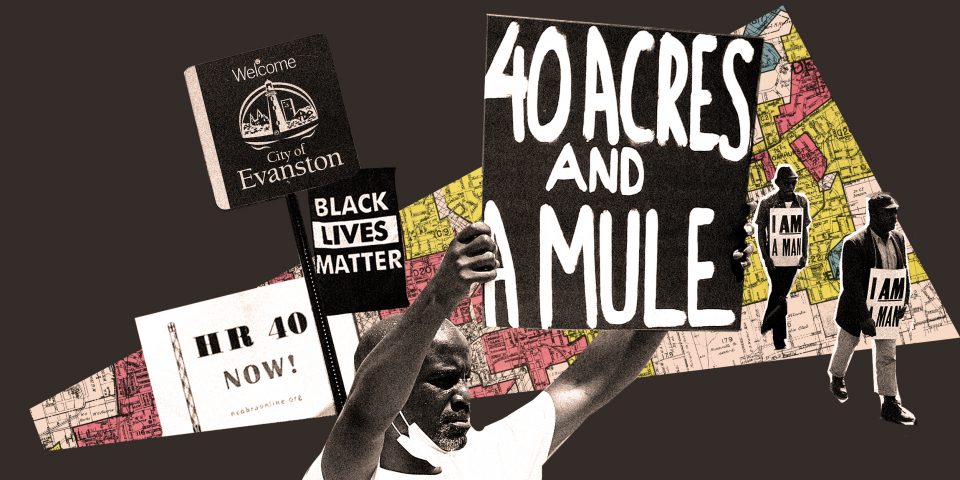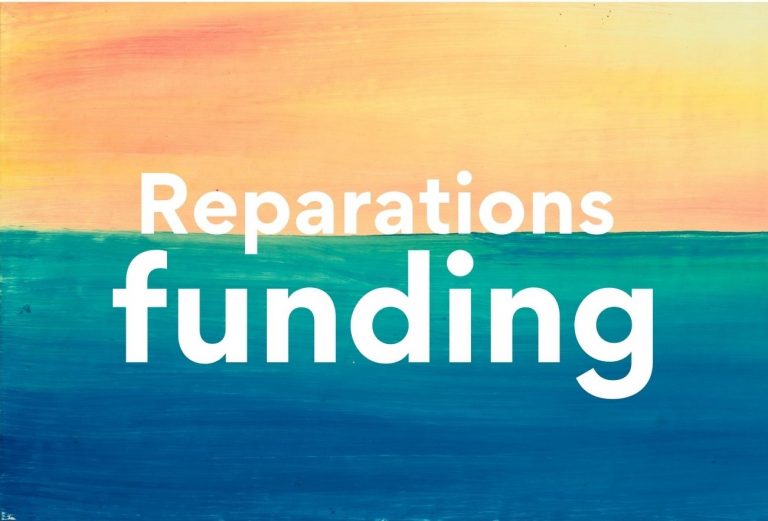Sterling Henry Jr.
I am an African-American male, born and raised in New Orleans, Louisiana. I am the ninth generation of African descendants in America. Five generations were enslaved, three lived under Jim Crow, and one is living post Jim-Crow or fully free. My son makes the 10th generation African American in this country.
The idea of reparations to African Americans for the impacts of slavery dates back at least to 1865. We know General William Tecumseh Sherman’s Special Field Order #15. It authorized “40 acres and a mule” to some families freed post the American Civil War. The backsliding began almost immediately.
The offer was not continued during The Reconstruction Era. It was not continued during the intervening 155 years–even as other reparations plans gained traction in American politics. Yet the idea of reparations for African Americans will not just go away.
The horrors of the chattel slavery system in America and subsequent decades of Jim Crow oppression included every sin imaginable.
- kidnapping,
- murder,
- rape,
- forced labor,
- outright theft,
- deliberate infliction of disease & injury,
- undernourishment,
- constant insults to human dignity,
- the denial of literacy
- the denial of political representation,
- and – perhaps the worst of all – the destruction of families.

These sins were repeated again and again, upon the same people, for 400 years. The scars are still visible today. We see limited opportunities and frustrated hopes of an entire race of people–American people.
In the United States and most of the western world, when a wrong is done to an individual, it is up to that individual to demand in court that the harm be corrected, including possible compensation. But when the damage is visited on an entire people and their descendants, the courts appear inadequate and powerless. We are forced to rely on the political system for redress – for the injured parties to be compensated.
There are examples of how that has been imposed and implemented. Reparations were paid to Native Americans and to Japanese Americans interned during World War II.
There is no reason, in my view, that African Americans should not be included in this class of Americans for whom reparations have been paid. Some people have suggested because of the history of slavery—how long it lasted; how many people were affected; and that those directly affected are no longer alive—designing a program is nearly impossible. However, I have developed a logical and reasonable plan.
It addresses the important issue of who would benefit and who would not. I believe that it is realistic enough to pass through the Congress and any President in the White House can sign the measure. It does not threaten the federal government, that I have have faith in, despite its limitations.
My proposal may not completely right the wrongs of slavery – nothing could – but it is achievable. And I believe that it would be effective at improving the lives of African Americans today and in the future.
Criteria to Benefit:
Obviously, not every African American could or should be eligible to participate in the Reparation or Relief program. Therefore, I have established criteria for selecting those who would benefit:
- African Americans who had one or several of their fore-parents who were forced into or born into chattel slavery. (Example: President Obama would not be eligible, but his children would be, by virtue of Michelle Obama’s ancestry.)
- African Americans who make this claim must show specific evidence as verification.
If this qualification is proven, then the following 12 programs of relief would be made available to the African-American claimant.
Taxes:
Relief from taxes–No African American would pay federal Income or Capital Gains Taxes of any kind for 10 years after making a reparations claim under this program. However, African Americans would still be responsible to pay state and local taxes; those taxes would not be part of this settlement. State and local governments may have allowed or even advocated harm against African Americans, which is subject for another and separate settlement.
Analysis: While African Americans are 13% of the US population, they constitute between 17.5% and 20.1% of all taxpayers – for a grand total of nearly $200 billion annually. Given that contribution to the American economy, annual reparations for African Americans should be of a comparable total. This would increase nearly all African-Americans’ income by 20 % to 30%.
Related: Reparations for Slavery
Many conservative public officials associate the reduction of taxes with economic growth. Although most of the tax cuts that has been approved in the past have mostly benefited wealthy Americans. African Americans have made up a very small portion of the “very rich;” so, they have had little impact upon that portion of society. This proposal would have a direct impact on the lives of nearly all African Americans and should produce a great deal of economic spin for the nation.
Further, all African-American owned companies also would be free of federal taxes for the first 10 years of their existence.
Analysis: Increase the likelihood of success of AA Business, considering the level of wholesale discrimination and fault/negative view of AA business and business people for the past 200 years, additional help to them is deserved.
All corporate or individual contributions to any African-American institutions, African-American National Park Service, and African-American Historic Sites would be written off as a tax credit of 110%.
Analysis: More corporate giving to African-American institutions and sites should produce much needed enhancements, and provide additional employment, beautification and economic growth around those institutions and sites.
Related: Reparations for African Americans in New Orleans
All companies that hire or subcontract with an African-American owned company would be allowed a tax credit of 150% of the value of that contract with the African-American owned company
Analysis: This would increase the likelihood of more usage of African-American businesses in all contracting in the United States.
Education:
All African Americans who have applied for Pell grants would be accepted and would receive a maximum Pell grant – regardless of their income level – and would be eligible for Pell Grants for life, at any level of post-secondary education.
And All African-American students would get a Supplemental Educational Opportunity Grants or SEOG Grant of $1000 – regardless of income.
All African-American undergraduates completing their bachelor’s degree (BA or BS) would be automatically admitted to any graduate program at any US state college or university.
All federal guaranteed or supported Student Loans would be forgiven.
So all of the above would apply to all African-American students, regardless of how long it might take reparations recipients to complete their college or graduate education. even if it takes them 10-30 years to finish college or graduate school.
Analysis: Education was denied to AAs for nearly 300 of the 400 years they have been in America. By any known standards formal education is the key steppingstone to personal economic uplift. All the education proposals (five through eight) are designed to keep AA in school and lessen their burden once they are there.
Title III of the Higher Education Act of 1965 (HBCU’s) would be funded at $1 billion for the next 20 years.
Analysis: HBCUs were originally established to educate and train the formerly enslaved. They have been doing this for over 130 years. Without them we would not have an AA professional class, or any significant portion of AA middle class in American today. However, HBCUs have been underfunded by the federal government, state governments, and education donors since their inception.
Museums and Landmarks:
*All African-Americans historical sites recognized by the National Park Service would be repaired and given a park ranger at the site.
*For 10 years after the enactment of Reparations laws, $500 Million per year would be appropriated for Institute of Museum and Library Services – Title 20 of the African-Americans Museum Program.
Analysis: They have been underfunded by the federal government, state governments and education contributors since their inception.
Health Care:
*All US medical and dental schools would be mandated that 10% to 15% of new students admitted per year would be African Americans.
*All African Americans – regardless of age – would be automatically eligible for Medicare benefits and would remain eligible for the rest of their lives.
Analysis: Slaves received very little health care. During the 100 years of Jim Crow, African Americans received very little health care: hospitals would not accept AAs, blood was segregated, and AAs couldn’t attend 95% of American medical and dental schools. Many experimental medical treatments were conducted on African Americans with little compensation.
I worked as a lobbyist and advocate for various organizations for nearly my entire career. At one time I was a presidential appointee. I do believe that this plan is realistic and would make a significant impact in the lives and future of the African American community. It would produce more wealth, create an even a greater pool educated experts in a large number of fields and improve the overall health status of the African American community, which is the overall goal of securing reparations.
Most members of Congress feel something should be done to right this historical wrong. However, there are no congressional sponsors and co-sponsors brave enough to assume leadership and take on this fight.
Pressure your congressperson and all other elected officials to do something to correct one of history’s great wrongs. I have offered options that Congress could pass. On behalf of the memory of African Americans’ ancestors, this nation needs to assist those that it harmed an allowed to be harm. We have nothing to lose!

